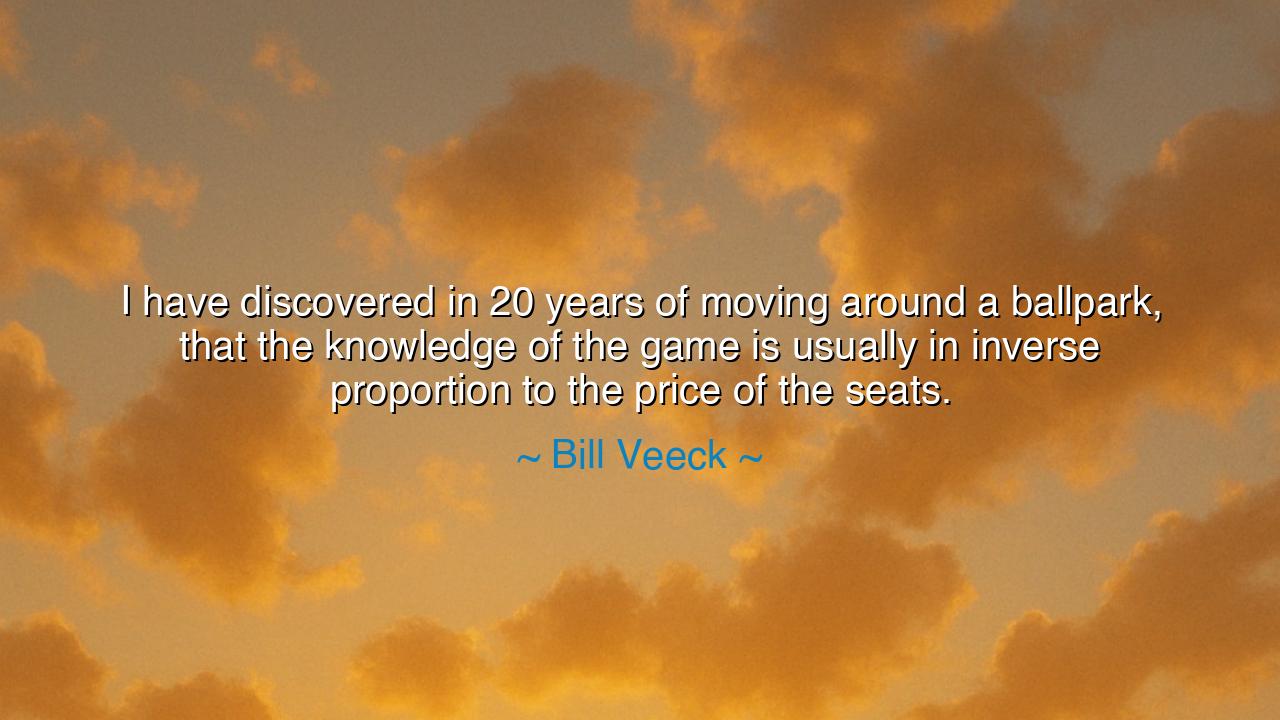
I have discovered in 20 years of moving around a ballpark, that
I have discovered in 20 years of moving around a ballpark, that the knowledge of the game is usually in inverse proportion to the price of the seats.






The words of Bill Veeck, the maverick of America’s pastime, carry a wisdom far deeper than the sport he loved: “I have discovered in 20 years of moving around a ballpark, that the knowledge of the game is usually in inverse proportion to the price of the seats.” Beneath the humor and wit of this saying lies an eternal truth about human nature, pride, and perception. It is not merely about baseball, but about the way the world often confuses privilege with understanding, and comfort with wisdom. For knowledge, true and living, is not bought with wealth—it is earned with passion, with struggle, and with time.
In the days of old, philosophers said that the gods give wisdom only to those who hunger for it. So too did Veeck, in his own modern way, remind us that those who sit closest to the heart of life—those who sweat, who strive, who labor without fanfare—often see more clearly than those who sit in luxury. The cheap seats, high and far from the field, are filled with the people who have lived the rhythm of the game: the workers, the dreamers, the ones who carry its stories in their bones. They know the feel of a curveball in the wind, the sound of a bat’s crack that tells whether the ball will fly or fall. The expensive seats, meanwhile, are often filled with those who come to be seen rather than to see. Their view is closer, but their understanding is farther away.
Consider the ancient story of the Spartan warriors. They lived simply, trained fiercely, and fought with discipline and heart. Meanwhile, the kings of Persia, clothed in gold and surrounded by silken tents, thought themselves the masters of war. Yet when the two met at Thermopylae, the poor and rugged Spartans, bound by duty and wisdom of battle, held back the greatest army the world had ever seen. Their knowledge, born of hardship, outweighed the wealth of an empire. Thus did Veeck’s jest echo the wisdom of ages—that true understanding dwells not in the seats of privilege, but in the hearts of those who live the struggle.
Veeck spoke from experience, for he was no ordinary owner. He walked the bleachers, talked with fans, and drank in the spirit of the crowd. He learned that the game’s soul lived not in the marble boxes, but in the sunburned faces of those who loved it purely. The old man with the transistor radio, the boy keeping score by hand, the woman shouting advice to the players—these were the true philosophers of the diamond. Their knowledge came not from status, but from love.
The wisdom of his quote reaches beyond the ballpark. In every field of life—whether in art, politics, or faith—it is often the humble who see with clearest eyes. The scholar in his tower may know the theory, but the farmer in the field knows the season. The executive may read reports, but the craftsman feels the grain of the wood and knows what the paper cannot tell. Wealth buys nearness to the stage, but not closeness to truth. Those who labor, who observe, who live the details—these are the ones who carry the world’s quiet genius.
Yet this is not a call to scorn the privileged or to glorify poverty—it is a reminder to remain humble before knowledge. For wisdom demands respect, not assumption. The great minds of history—from Socrates to Lincoln—were not those who claimed to know most, but those who listened most deeply. Veeck’s laughter hides a sacred lesson: that understanding is not a possession, but a practice. Whether in baseball or in life, the true student never stops learning, and the wise never stop listening.
So, O seeker of truth, remember this: when you walk through the ballpark of life, do not judge the worth of a man’s insight by the cost of his seat. Listen instead for the voice that speaks from experience, from heart, from passion. Sit among the people who love what they do, who live what they know. For wisdom dwells where the soul engages, not where comfort rests.
Therefore, let this be your guide: seek the high wisdom of the humble and the humble wisdom of the high. Do not dismiss the lowly, for their eyes have seen what gold cannot buy. And whether you sit in the grandstand or the bleachers, remember—knowledge is not measured by proximity, but by presence; not by wealth, but by wonder.






AAdministratorAdministrator
Welcome, honored guests. Please leave a comment, we will respond soon